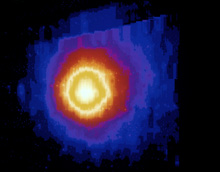------------------------------
Click on the First stage goes up link and follow the assembly! – next stop Jupiter...
Rocket assembly photo galleries:
First stage goes up | First solid booster added
Fifth booster installed | Centaur stage hoisted
Juno encapsulated in nose cone
Spacecraft mounted atop the rocket
First stage goes up | First solid booster added
Fifth booster installed | Centaur stage hoisted
Juno encapsulated in nose cone
Spacecraft mounted atop the rocket
------------------------------
I hope everything goes as planned.
- LRK -
------------------------------
http://www.nasa.gov/mission_
Key things to know about JunoJuno will improve our understanding of our solar system’s beginnings by revealing the origin and evolution of Jupiter.
Specifically, Juno will…Have a question about Juno or Jupiter not covered on this website? Submit it to Juno Outreach!
FRR Completed, Aug. 5 Launch for Juno Set
Fri, 29 Jul 2011 07:52:40 AM PDTThe Flight Readiness Review was completed this morning ahead of next week's launch of the Juno mission to Jupiter. The session went smoothly, ending with officials formally setting Aug. 5 as the liftoff date for the spacecraft on an Atlas V rocket from Cape Canaveral Air Force Station in Florida. NASA's Launch Services Program is overseeing the launch, while the mission is managed by Jet Propulsion Laboratory in Pasadena, Calif.
Mission Info
Specifically, Juno will…Have a question about Juno or Jupiter not covered on this website? Submit it to Juno Outreach!
snip
------------------------------
Now the remaining question left is what sort of NASA will we have come August 2, 2011 and the Debt Limit count down reaches ZERO.
- LRK -
Thanks for looking up with me.
- LRK -
Web Site: http://lkellogg.vttoth.
Web Site: http://lkellogg.vttoth.
WordPress: http://lrkellogg.
==============================
JUNO
Juno is a mission of discovery and exploration that will conduct an in-depth study of Jupiter, the most massive planet in our solar system. Peering through the clouds deep into Jupiter’s atmosphere, the mission will reveal fundamental processes of the formation and early evolution of our solar system. Juno’s goal is to understand the origin and evolution of the gas giant planet, which will pave the way to a better understanding of our solar system and other planetary systems being discovered around other stars.
Using a spinning, solar-powered spacecraft, Juno will make maps of the gravity, magnetic fields, and atmospheric composition of Jupiter from a unique polar orbit. Juno will carry precise high-sensitivity radiometers, magnetometers, and gravity science systems . During its one-year mission, Juno will complete 33 eleven-day-long orbits and will sample Jupiter's full range of latitudes and longitudes. From its polar perspective, Juno combines in situ and remote sensing observations to explore the polar magnetosphere and determine what drives Jupiter’s remarkable auroras.
snip
==============================
JUNO MISSION OVERVIEW
The Juno mission is the next scientific investigation in the NASA New Frontiers Program. The mission's primary science goal is to significantly improve our understanding of the formation and structure of Jupiter. By advancing our knowledge of the giant planet, we will also dramatically advance our understanding of the origins and early evolution of our own solar system at the most fundamental level.
The Juno spacecraft will investigate Jupiter's origins, its interior structure, its deep atmosphere and its magnetosphere from an innovative, highly elliptical orbit with a suite of seven science instruments. In addition, a camera called JunoCam will be used by student participants in the Juno Education and Public Outreach program to take the first images of Jupiter's polar regions.
The Juno spacecraft will investigate Jupiter's origins, its interior structure, its deep atmosphere and its magnetosphere from an innovative, highly elliptical orbit with a suite of seven science instruments. In addition, a camera called JunoCam will be used by student participants in the Juno Education and Public Outreach program to take the first images of Jupiter's polar regions.
snip
==============================
WHAT THE MIND CAN CONCEIVE, AND BELIEVE, IT WILL ACHIEVE - LRK -
==============================





No comments:
Post a Comment
Note: Only a member of this blog may post a comment.